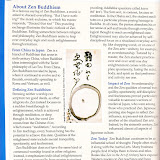 |
| Zen Parables |
Sunday, February 26, 2012
Zen Parables
Rumi: Mystic Poet

| Rumi |
Here is an interesting Web site dedicated to Rumi. Here's a bit of Rumi's bio from that site:
Rumi was born on the Eastern shores of the Persian Empire on September 30, 1207, in the city of Balkh in what is now Afghanistan and finally settled in the town of Konya, in what is now Turkey. Today three countries claim him as their national poet: Iran, Turkey and Afghanistan. However none of these countries as they are today actually existed back then. Iran was called the Persian Empire, a monarchy, and it was quite larger than it is today. It included all of today's Iran and Afghanistan also parts of Pakistan, Turkmenistan, Tajikistan, Uzbekistan, Turkey and Iraq. Turkey had not yet formed then and Afghanistan was part of the Khorasan Province in the old Persian Empire.
Rumi's life story is full of intrigue and high drama mixed with intense creative outbursts. Rumi was a charming, wealthy nobleman, a genius theologian and a brilliant but sober scholar, who in his late thirties met a wandering and wild holy man by the name of Shams. In Rumi's own words, after meeting Shams he was transformed from a bookish, sober scholar to an impassioned seeker of the truth and love.
Click here for information about whirling dervishes.
Friday, February 3, 2012
Ogonkwo's Obituary
You are Nwoye, Okonkwo's son and a recent convert to Christianity. You have just learned that your father has committed suicide following his traumatic experiences with your church and government that are now running the village. It is your job to write your father's obituary, and you have 30 minutes to complete it before the paper goes to press.
How to Write an Obituary
The obituary documents the deceased person's life. It informs the public of death and gives information about planned funeral and memorial services. The goal of the obituary is to demonstrate respect and honor for those who have passed, while informing those who remain of his or her death.
1. Begin with the announcement. It should include who the person is, the date they died, and where they died. The cause of death is optional. Be short and concise. All this can be typically included in one sentence.
2. Recount the main events in the person's life, beginning with his or her birth and birthplace.
Try to remember specific instances when he made a difference in the lives of others in his community and family. Instead of just listing her achievements, tell a brief story about some of them. Keep an eye out for moments that speak eloquently of his character and disposition
3. Include a list of schools attended, degrees received, vocation and hobbies.
4. Include who the person is survived by. Include, in this order, immediate family members (spouse and children or parents and siblings step-children) and secondary family members (aunts, uncles, grandchildren, close cousins).You can include spouse names such as Mary (John), John (Anna), ...
5. Announce when and where the funeral, burial, wake and/or memorial service will take place.
6. Conclude with a statement regarding where memorial contributions can be sent, if applicable.
Subscribe to:
Comments (Atom)
